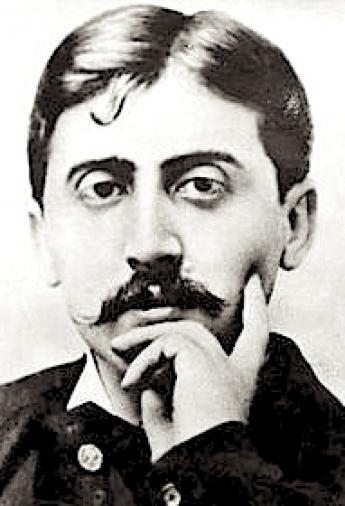Antiquarian Booksellers' Association of America Lighthouse Books, ABAA
Collecting Rare Books and First Editions - Happy birthday, Marcel Proust!

By Michael Slicker
July 10, 2012: It is the birthday of the French novelist Marcel Proust (1871), whose seven-volume Remembrance of Things Past (published 1813 to 1827) is considered his masterpiece.
It is an ambitious work, including some 3,200 pages and almost 1.5 million words. There are 2,000 characters in the book. Critics call it one of the greatest works of the 20th century. It is certainly one of the longest.
It is narrated by a young man who wants to become a writer (surely Proust himself), and includes his observations on life in Paris in the late 19th and early 20th centuries. Critics say it is not exactly a biography, for many of the incidents have been fictionalized or enhanced for literary effect. It does, however, mirror Proust's life in many ways.
Proust wrote articles for magazines and maintained a regular column in a Paris newspaper about Parisian aristocracy. He also volunteered at the Mazarine Public Library in Paris as a ploy to keep from having to get a real career as his father wished. Proust never really worked at the library. Instead he got an extended leave of absence that allowed him time to write.
Most notable about Proust's novel is the involuntary memory theme, in which everyday activities trigger recollections of events of the past. An aroma or a taste or the sight of a certain object might bring back thoughts of an earlier time. Famously, the book contains what is known as the episode of the Madeleine, in which a sponge cake dipped into herbal tea produced a memory for the writer. Proust uses this involuntary memory device throughout the book.
The author published the first volume himself after being rejected by numerous publishers. Subsequent volumes were published by his original printer. With the success of the first volume, one of the publishers to whom he had submitted his book offered to publish the rest but Proust elected to stay with his original printer, at least until the company shut down at the beginning of World War I.
Only four volumes were printed in Proust's lifetime. His brother, Robert, published the other three volumes after Marcel's death in 1922. The book has been translated into English numerous times under the title In Search of Lost Time, most recently in Britain in 2002.
You are looking for rare Marcel Proust editions?
>>> Browse the ILAB Metasearch
(Posted in the Lighthouse Books Blog. Presented here by permission of the author.)
